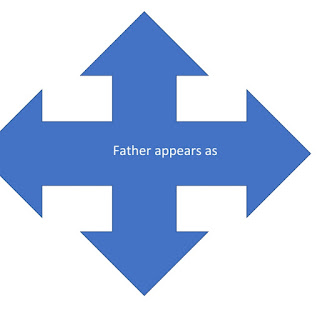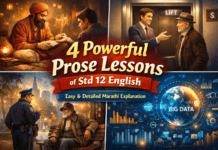The poem ’Father Returning Home’ is taken from ‘Traveling in a cage’- by Dilip Chitre. It draws a portrait of a suburban father as commuter.In this post you will find brainstorming activities and Father Returning Home poem appreciation and 3 question sets as per board pattern of English std 12.
2.5 Father Returning Home Glossary
commuters – प्रवाशी
suburbs – उपनगर
soggy – कुजका
stained – डागाळलेली
fade – कोमेजली
humid – दमट
get off the train – उतरणे
stale – शीळे
contemplate – विचार करणे
estrangement – परकेपणा, तेढ
trembles – थरथरणे
cling – लगटणे, चीपकणे
sullen – उदासीन
refused – नाकारले
static – खरखर आवाज
ancestors – वाडवडील
nomads – भटका, भटकणारा
Paraphrase of Father Returning Home
The poet’s father returns late in the evening. He finds no room in the local train to sit. He is neglected when commutes from office to home. He is a man of middle class mentality. He is growing old. He hurries towards home. At home there is no proper food and tea. He is not entertained by his children. He passes his time with radio and dreams about his ancestors and grandchildren.
Summary
“Dilip Chitre’s Father Returning Home” is a poem that reflects on the experience of an aging father returning to his family home after a day of work. The poem captures the mundane yet profound moments of the father’s journey as he navigates through the streets, tired and weary. Through vivid imagery and sensory details, Chitre paints a picture of the father’s exhaustion, his stooped posture, and the weight of his burdens. Despite the weariness, there is a sense of quiet dignity and resilience in the father’s demeanor as he makes his way back to his loved ones. The poem evokes feelings of empathy and nostalgia, highlighting the universal themes of family, duty, and the passage of time. Overall, “Father Returning Home” pays tribute to the everyday struggles and sacrifices of ordinary people, while also celebrating the enduring bond between parent and child.
Brainstorming for Father Returning Home by Dilip Chitre
1. Themes
Alienation and Loneliness – The father is physically present but emotionally disconnected from his surroundings and family.
Monotony of Life – His routine is repetitive, highlighting the dullness of his existence.
Urbanization vs. Traditional Life – The poem contrasts city life with personal isolation.
Generation Gap – The father feels distant from his children and the modern world.
Aging and Neglect – The poem portrays the struggles of an aging individual in a fast-moving society.
2. Main Character: The Father
A tired, elderly man returning home from work.
Appears worn out and detached from his surroundings.
Experiences a lonely journey despite being in a crowded train.
At home, he is ignored by his family and spends time in solitude.
Reflects on his life in his sleep, possibly dreaming of the past.
3. Imagery and Symbolism
The Crowded Local Train – Represents urban chaos and isolation despite the crowd.
His Wet Clothes and Shabby Appearance – Reflects his struggle and hardship.
The Dimly Lit Home – Suggests neglect and emotional distance.
Talking to Himself in the Toilet – Symbolizes deep loneliness and a lack of companionship.
4. Structure and Style
Free Verse – No rhyme scheme, mirroring the natural flow of life.
Simple and Direct Language – Makes the poem relatable and impactful.
Visual and Sensory Imagery – Helps readers feel the father’s emotions and surroundings.
Brainstorming on Father Returning Home
(A1) (i) Discuss with your friend the difficulties faced by the father in the poem.
(a)The father did not get a seat while commuting to office from home.
(b)He worked late in the evening.
(c) He was deprived of fresh tea and food.
(d) He was not entertained at home.
(ii) Discuss the character sketch of the father with the help of the given points.
(His pathetic condition, the treatment he receives at home, his solitude, the
way he tries to overcome it)
(a) Father was a silent commuter wearing soggy shirts and pants.
(b) He had a weak eyesight. At home the children did not treat him well.
(c) He was alone at the train and home.
(d) He listened to the static on radio and dreamt of his ancestor and grandchildren.
(A2) (i) Given below are the ideas conveyed through the poem. Match the pairs and draw out the hidden meaning from those expressions.
| Expressions | Meanings |
| (a) Children avoid expressing themselves. | (1) Father is so eager to meet family members that he even doesn’t bother about his safety. |
| (b) Father was deprived of refreshing hot beverages or nourishing diet. | (2) Hostility of children |
| (c) The father hurries home crossing railway line | (3) Indulge into his past and future. |
| (d) The father was destined to listen only to the cracking sounds on media. | (4) Uncomfortable journey |
| (e) His sordid present is devoid of any hope. | (5) His basic daily requirements were also not catered to. |
| (f) The father’s endless commuting distance him from his children | (6) Father is not less than any tribal wanderer, a modern nomad. |
| (g) Suburban area, visible through the train, is past unnoticed. | (7) Has least value in the society where his presence or absence might hardly make any difference. |
| (h) He is just as a small word, dropping from a sentence. | (8) Because there is hardly anything enchanting / interesting in the monotonous routine journey to look out of the window |
| (i) He doesn’t get a place in a crowded train. | (9) The father couldn’t even fulfil the least expectation of entertaining himself. |
Ans : (a) – 2 ; (b) – 5 ; (c) – 1 ; (d) – 9 ; (e) – 7 ; (f) – 6; (g) – 8 ; (h) – 4 ; ( I ) – 6
(ii) Find the lines to prove the following facts from the poem.
Father is deprived of good food
“Drinking weak tea; eating stale chapatti.”
Children did not have a healthy relation with the father.
“His sullen children have often refused to share”
(iii) The poet deals with the theme of man’s estrangement from a man-made world. Analyze it with the help of the poem.
Ans: In the poem the father is described as alienated from the world and his own family. He travels among the silent commuters. He is neglected by the commuters. He is described as a word dropped from the sentence. He is not entertained at home by his children. The children refused to share simple jokes and daily routine with the father.
(iv) The father contemplates about his past and peeps into his future. Give reasons.
Ans: He was alienated from the society and the family. He was not allowed to entertain jokes and stories at home. To overcome his solitude he contemplates about his past and peeps into his future.
(A3) Complete the following using suitable describing words as appeared in the poem with the help of the words given in the brackets :
(weak, dim, muddy, soggy, stale)
(a) Father’s attire
(b) Father’s tea
(c) Father’s footwear
(d) Father’s food
(e) Father’s eyesight
Ans : (a) Father’s attire –soggy (b) Father’s tea – weak (c) Father’s footwear – muddy (d) Father’s food – stale (e) Father’s eyesight – dim
(A4) (i) ‘Fade homeward through the humid monsoon night’.
In the above line the weather is humid, not the night. The epithet or adjective is transferred from the weather to the night. This figure of speech is Transferred Epithet. Find out such other expressions from the poem.
Ans : unseeing eyes, weak tea, gray platform
(ii) Identify and write the lines from the poem which express the following figures of speech.
Poetic Devices from Father Returning Home
1. Simile
Like a word dropped from a long sentence
Father is implicitly compared with a word.
2. Alliteration
Suburbs slide
A consonantal sound ‘s’ r repeated pleasingly.
3. Onomatopoeia
Listening to the static
‘static’ is a sound word.
4. Synecdoche
I see him drinking weak tea, eating a stale chapati.
Here ‘stale chapati’ stands for stale food, where the part symbolizes the whole, i.e. food.
5. Transferred epithet
‘Fade homeward through the humid monsoon night’.
The epithet or adjective ‘humid’ is transferred from the weather to the night.
Question Bank Activity from Father Returning Home
Father Returning Home
Home again, I see him drinking weak tea,
Eating a stale chapati, reading a book.
He goes into the toilet to contemplate
Man's estrangement from a man-made world.
Coming out he trembles at the sink,
The cold water running over his brown hands,
A few droplets cling to the greying hairs on his wrists.
His sullen children have often refused to share
Jokes and secrets with him. He will now go to sleep
Listening to the static on the radio, dreaming
Of his ancestors and grandchildren, thinking
Of nomads entering a subcontinent through a narrow pass.
A1 Complete the given flowchart about father’s activities at home. (02)
Drinking weak tea , eating stale chapati
⬇️
…,……………………………………..
⬇️
…………………….,……………………………..
⬇️Listening to the static on the radio
Ans : Drinking weak tea , eating stale chapati
⬇️
Contemplating in toilet
⬇️
Trembling at the sink while cleaning hands
⬇️
Listening to the static on the radio
A2 Find the lines to highlight the relation of children and father. (02)
a) His sullen children have often refused to share
Jokes and secrets with him.
b) Home again, I see him drinking weak tea,
Eating a stale chapati.
A3 Would you like to celebrate ‘Father’s day’? If yes how/ If not why? (02)
Ans : No, I don’t like to celebrate ‘Father’s Day’ . For me every day is a parent’s day. Celebrating one day in their name and not respecting on all other days is not a wise idea. Instead of celebrating one day I prefer to listen to them and talk to them. I want to be there whenever they need me.
A4 Name the figure of speech(Poetic Devices) in the following line and give one more example. (02)
“coming out he trembles at the sink”
Ans : Hyperbole – The statement is exaggerated.
A5 (Poetic Creativity)
Read the following lines and add two poetic lines to rhyme with line. (02)
He will now go to sleep
Listening to static on the radio……………………………………………….
Ans : He will now go to sleep
Listening to static on the radio
With vibrant audio
Till he gets sound sleep.
Activity Sheet No 2 On Father Returning Home
Q. 1 A Read the extract from Father Returning Home and do all the activities given below.
A1. Complete the web chart.

A2. Find the lines to prove the facts from the poem.
a. Father is isolated from the society and family.
b. Generation Gap
A3. Write a character sketch of your father.
A4. (Poetic Devices)Find examples of transferred epithet and synecdoche.
A5. Replace the words from the following lines and rewrite :
Home again, I see him drinking weak tea
Eating a stale Chapati, reading a book.
Click the “Hide/Show” button to toggle between hiding and showing the answers:
Brainstorming Activities Song of the Open Road
Question Set 3
Que1: Draw a timeline or flowchart showing the father’s journey from the train to his home. Include details about his physical and emotional state at each stage.
Answer Key: Timeline should include: train journey (weariness, soggy clothes), walking home (muddy chappals, dim eyes), reaching home (weak tea, stale chapati), and his solitude.
2. Explain the father’s relationship with his family.
The poem suggests a strained and distant relationship. The father’s children are described as “sullen” and unwilling to share their lives with him, reflecting a lack of warmth or connection.
3. How does the poem make you feel about the father’s life?
(Personal response will vary.) It evokes sympathy for the father’s isolation and struggles, while also prompting reflection on how modern life can alienate individuals from their families and surroundings.
4. Identify and explain a simile used in the poem.
The line “Like a word dropped from a long sentence” is a simile. It compares the father to a word disconnected from its context, symbolizing his feeling of alienation and lack of belonging.
5. If you were to rewrite the ending of the poem, how would you change it to give the father a sense of hope or connection.
Beneath the dim light, his stories unfold,
Of youthful days and adventures bold.
The children listen, their hearts drawn near,
Lost in his words, they find warmth sincere.
Appreciation
Father Returning Home Appreciation
Write a poetic appreciation of the poem 2.5 ‘Father Returning Home’ with the help of the following points.
· About the poem / poet and the title.

· The theme
· Poetic Style
· Language /Poetic devices
· Special features
· Message, values, morals in the poem
· Your opinions about the poem
Dilip Chitre was a celebrated bilingual poet. He was a translator with a remarkable work in Marathi and English.
The poem ’Father Returning Home’ is taken from ‘Traveling in a cage’- by Dilip Chitre. It draws a portrait of a suburban father as commuter. The poem depicts dull and monotonous routine of father. The father is alienated in his home. His children refuse to share their joys and sorrows with the hardworking father. This painful loneliness is a symbol of man’s isolation from the materialistic man-made world. The father is described as lonely creature in his train and at home. He just dreams about his past and future.
The poem has no regular rhyming words and rhyme scheme. The poem is divided into two stanzas. In the first stanza the vivid description of father as a commuter draws the attention. In the second stanza his painful loneliness at home is shown. Simile, alliteration, onomatopoeia and synecdoche, transferred epithet are the striking figures of speech used in the poem.
The underlying message of the poem generation gap in the modern age has created disrespect for the elders. In spite of all the odds the father devote his life for the children.









Excellent activities.
Good help to all students and teachers.
Nice
Excellent work
Done In a very simple language which will definitely help any student learning this content.
Thank you.
Easy way to learn
1.1 ka chapter
An Astrologer’s Day https://englishforme.in/an-astrologers-day/2022/
It was easy to study
appreciation in sab poem
Appreciation of all Poems https://englishforme.in/?p=2311
Hi